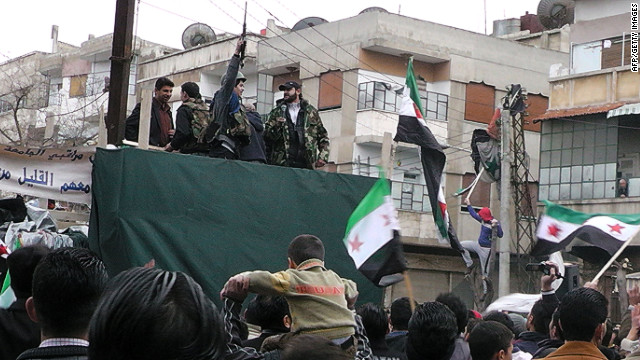By Adom M. Cooper
Impunity Watch Reporter, Middle East
DAMASCUS, Syria–In the latest developments coming out of Syria, President Bashar al-Assad has officially offered amnesty to anyone accused of crimes in connection with demonstrations and protests that have occurred in the last 10 months of anti-regime unrest and ensuing violence. al-Assad has previously made similar statements on three previous occasions in May, June, and November of 2011.

This time, al-Assad made the announcement on the official SANA news agency and broadcast on state television. According to the announcement, it would apply to army deserters who turned themselves in before the end of January, peaceful protesters, and those who handed in unlicensed weapons. The statement included the following segment.
“Amnesty is granted for crimes committed in the context of the events taking place since March 1, 2011, till the date of issuing the decree.”
Opposition groups did not respond immediately to the amnesty pledge, as this is the first time that al-Assad has made it since forces loyal to him have lost control of parts of Syria’s cities and towns.
Since the demonstrations and protests began in March 2011, SANA has reported that al-Assad has freed approximately 3,952 prisoners. The opposition claims that there are thousands more in Syrian prisons and said that 26 people had died on Sunday 15 January 2012, including a policeman and soldier killed by security forces for refusing to fire upon protesters. Among the individuals who lost their lives on Sunday 15 January 2011, five were factory workers killed when their bus was hit by a bomb in the northern province of Idlib.
In the past year, tens of thousands of people have been detained in the past year. The UN estimates that at least 5,000 people have been killed since initial peaceful protests against al-Assad’s regime turned violent. Many demonstrations and protests were met with brutal security crackdowns, which ignited an ongoing armed conflict that has seen both the military and the opposition orchestrate attacks.
UN chief Ban Ki-Moon released a statement on Sunday 15 January 2012 concerning the ongoing situation in Syria.
“Today, I say again to President Assad of Syria: Stop the violence. Stop killing your people. The path of repression is a dead end. The lessons of the past year are eloquent and clear. The winds of change will not cease to blow. The flame ignited in Tunisia will not be dimmed. Let us remember as well, none of these great changes began with a call for a regime change. First and foremost, people wanted dignity.”
Residents in the town of Zabadani, approximately 50 km (30 miles) northwest of Damascus, cheered as Arab League monitors visited their area. These residents, according to CNN, stated that their water and electricity had been cut off from the past three days and displayed fresh wounds from conflicts with pro-government forces.
When the monitors were ready to leave after their inspection of this designated area, many thousands of residents implored them to stay, stating that the attacks would resume once they had left. Many of the residents offered to show the monitors where Syria tanks were hidden in fields surrounding the city. al-Assad’s regime was required to pull its heavy weaponry out of the cities under the agreement that was signed with the Arab League in November 2011. But the residents of Zabadani claimed that the tanks were only absent when the Arab League monitors were present.
Fares Mohammed, a spokesman for the Local Coordination Committees of Syria, claimed that about 100 armored vehicles had surrounded the city for three days. Also, that the power and water were cut off, while the city faced sub-freezing temperatures. A member of the Free Syria Army, which is composed primarily of deserters who are siding with the opposition, stated that there were about 70 lightly armored fighters in Zabadani. He gave this statement to CNN, asking not to be named for security purposes.
“The situation is very bad. The siege is choking us, and even air is running out.”
Despite its large presence, the Arab League continues to struggle with its mission of holistically quelling the violence in Syria. The current delegation in the country has not stopped drawing fierce criticisms from both sides of the conflict and a general consensus exists that the mission has failed. However, there is also a general consensus that it is important to keep away intervention from outside of the Arab world, the same intervention in Libya that helped bring down Muammar Gaddafi.
Amr Moussa, who left the Arab League leader’s chair last year, showed support for a Qatari proposal to send Arab troops in Syria to deal with the violence. He shared these sentiments with a correspondent from The Guardian.
“This is a very important proposal. The Arab League should begin to study this possibility and begin consultations on this issue.”
The ruler of Qatar, Sheikh Hamad bin Khalifa Al Thani, shared these words with US news outlet CBS in his support of sending in Arab troops.
“For such a situation to stop the killing, some troops should go to stop the killing.”
It appears that the more al-Assad talks about making changes for his people, the more of them seem to suffer or be put at risk to suffer.
For more information, please see:
Ahram – Syrian President Grants General Amnesty – 15 January 2012
Al-Jazeera – Assad Offers ‘Amnesty’ For Opposition – 15 January 2012
BBC – Syria Crisis: Assad ‘Gives Amnesty For Uprising Crimes – 15 January 2012
CNN – Syria Toll Rises To 25; Monitors Cheered In Besieged Town – 15 January 2012
The Guardian – Syria Offers Second Amnesty to Anti-Regime Protesters – 15 January 2012
NYT – Fear of Civil War Mounts in Syria as Crisis Deepens – 14 January 2012